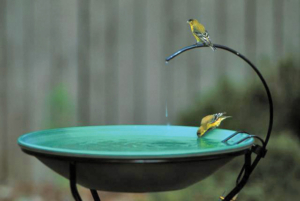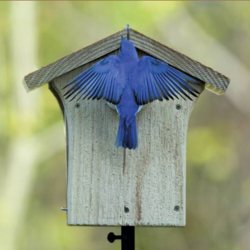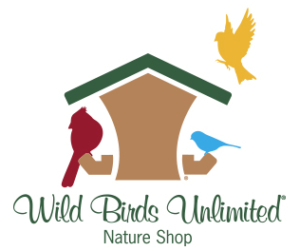Most birds aren’t too hard to please. If they feel safe and can easily find fresh food and water, chances are they will come back with frequency.
Wild Birds Unlimited is proud to be the Champion for the National Wildlife Federation’s Certified Wildlife Habitat program. Creating a wildlife habitat is fun, rewarding, and makes a big difference. By adding the elements outlined below—food, water, shelter, and a place to raise young—your yard can become a wildlife habitat. To learn even more, visit our website.
WATER

Water is vitally important to birds. They need a dependable year-round water source for drinking and bathing. Providing water is the simplest and most important step you can take to increase the variety of birds in your yard. It can also increase your enjoyment of your birds by allowing you to watch their antics as they drink, bathe and preen.
Water can be supplied in a bird bath, small pool, recirculating waterfall, shallow dish or from a dripping hose. Do not use any solutions or soaps in your bird bath to keep it clean. Every other day you should empty the bath, scrub it with a brush and rinse it well. Refill with fresh water. If alga builds up quickly, you can use ten parts water to one part bleach solution to clean the bird bath. Be sure to rinse well and place fresh water in the bath.
During freezing weather, use a bird bath heater to ensure that birds have a reliable, open source of water.
FOOD
There are many varieties of specialized bird feeders available, but most fall into three basic categories:
• Ground-feeding trays or platform feeders
• Elevated feeders such as hopper and tube feeders
• Suet feeders
By providing bird feeders that recreate the natural feeding preference of birds, you will attract a greater variety of birds to your backyard throughout the year. You can provide fruit and nectar feeders for nectar eating birds. You can add suet feeders for insect eating birds. Peanut feeders will attract a variety of birds such as titmice, nuthatches, and woodpeckers. The Certified Bird Feeding Specialists at Wild Birds Unlimited stores can help you choose the right seed for your situation.
SHELTER

Birds need nearby protective cover from predators in order to feel safe enough to visit your feeders. Cover can be provided in many forms such as hedgerows, hollow logs, wood or brush piles, or overhanging tree branches. Plants that bear fruit for food will be the most attractive. The ideal bird habitat would include plants ranging in size and density from small evergreen shrubs to tall, full-grown trees. This variety will provide birds a choice for feeding, hiding, courting, and nesting.
Wild Birds Unlimited is a sponsor of Gardening for Birds at birdgardens.ca, an excellent resource on how to plan a bird friendly landscape from the conservation group Birds Canada.
PLACES TO RAISE YOUNG
With more and more destruction of their natural habitats, many birds are having trouble finding places to nest. Nesting boxes, or bird houses, will encourage birds to raise their young in your backyard. EcoTough® Nest Boxes include the key elements needed for a successful nesting experience. They include proper drainage and ventilation to keep babies dry and have a unique two-way opening system on the roof makes cleaning and monitoring a snap.
MANAGING THE GUEST LIST
You might have a vision of goldfinches, cardinals, and bluebirds creating a colorful gathering, but it’s hard to serve nature an exclusive invitation.
Here’s what you can do to encourage unique birds to visit.
DON’T OVERFEED. Put out only as much food as the birds will eat each day. All Wild Birds Unlimited custom seed blends are regionally selected to contain the seeds your local birds prefer – so fewer seeds are wasted and dropped to the ground.
SQUIRREL AND RACCOON BAFFLES can be attached to the Wild Birds Unlimited patented Advanced Pole System® (APS). Set up this modular system out of leaping range then add the feeding elements best suited to your backyard. Deter pigeons by avoiding mixes with cracked corn, millet, or cereal blends. They will also have a hard time accessing a weight sensitive feeder or cage feeder.
NO ONE AT THE PARTY? Birds have many reasons to not RSVP. Dirty feeders are not attractive, so clean them once a month. Predators like hawks or outdoor housecats might be hanging around. Visit our website to learn more about how to deter them.
Comments are not available on this story. Read more about why we allow commenting on some stories and not on others.
We believe it's important to offer commenting on certain stories as a benefit to our readers. At its best, our comments sections can be a productive platform for readers to engage with our journalism, offer thoughts on coverage and issues, and drive conversation in a respectful, solutions-based way. It's a form of open discourse that can be useful to our community, public officials, journalists and others.
We do not enable comments on everything — exceptions include most crime stories, and coverage involving personal tragedy or sensitive issues that invite personal attacks instead of thoughtful discussion.
You can read more here about our commenting policy and terms of use. More information is also found on our FAQs.
Show less